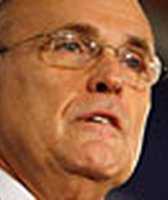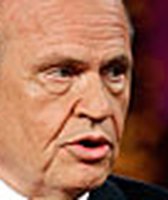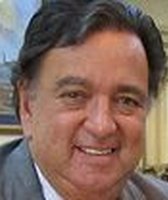Get PolitiFact in your inbox.
SUMMARY: Former Gov. Mike Huckabee made his way through Arkansas' Democratic political landscape as a social conservative Republican with a streak of populist empathy for the downtrodden. It's that last part that's causing him grief among Republicans.
Up in the far northwest corner of Arkansas, where tight-fisted Sam Walton started the Wal-Mart empire and where Tyson Foods is the world's largest chicken processor, Republican State Sen. Kim Hendren thinks Democrat Bill Clinton and Huckabee were both good governors of Arkansas.
"America didn't do too badly when [Clinton] served those eight years in Washington," Hendren adds. Even allowing for some Arkansas pride, that's not something you hear from Republicans very much.
It's a sign that there is something different about a lot of Arkansas Republicans.
Mike Huckabee among them. Huckabee has built his political career on a prairie populism more reminiscent of Bible-thumping common man William Jennings Bryan or activist reformer Theodore Roosevelt a century ago than tax-cutting Ronald Reagan.
Huckabee's campaign for lieutenant governor in 1993 was intentionally populist, says his adviser at the time, Dick Morris, who was also a key political adviser to Clinton. "A southern Republican must separate himself from the country club and high society ethic with which his national party is associated and stake out ground as a rural populist," Morris wrote that year in Campaigns & Elections magazine about Huckabee's surprise victory.
Republicans don't win a lot of elections in Arkansas. Democrats hold every statewide office, three of four congressional seats, 27 of 35 State Senate seats and 75 of 100 House seats. Huckabee's win in 1993 against a well-funded, well-supported Democrat was a surprise.
Hendren, a businessman who proudly sells just about every brand of American car at his car dealerships and also runs a radio station and other businesses, says Huckabee and other Republicans in Arkansas have to be more pragmatic than ideological to survive. In a state known for low taxes, poor education and poor transportation, there has been little opportunity for the tax-cut wing of the Republican Party. In fact, in 2002, voters rejected a constitutional initiative to eliminate the 6 percent sales tax on groceries.
Besides, Arkansas voters get more for their tax money. They receive $1.40 in federal benefits for every dollar they pay in federal taxes, compared with less than 80 cents in California, New York and Massachusetts.
Two hundred miles southeast of Hendren's fast-growing Senate district, down new Interstate 540 and across the I-40 rebuilt with Huckabee's highway bonds and gas-tax increase, the former chairman of the Arkansas Republican Party, State Sen. Gilbert Baker, agrees that Huckabee's unconventional Republicanism reflects political practicality.
"Republicans in Arkansas are very strong social conservatives, but we are at a very minority level in the legislature," Baker says. "We like to accomplish things."
Social conservatism is indeed a powerful force. Arkansas voters approved a referendum against gay marriage by 74 percent. For Huckabee, as a Southern Baptist preacher, it was central to his campaign. "My faith doesn't influence my decisions, it drives them," his presidential campaign Web site says.
Yet his is not the god of free-enterprise, but of government action. His first campaign ads in 1993 were designed "to explain how values were relevant to the concerns normally associated only with liberal Democrats," Morris wrote. "The opening ad speaks of the need for home health care alternatives for the elderly, and the second stresses apprenticeship programs for non-college bound students."
In 2003, when an economic downturn struck the state, Arkansas legislators who had to deal with declining tax revenues were more concerned about maintaining the modest government services than cutting them. At the same time, he had to deal with an order from the Arkansas Supreme Court to dramatically change school funding. The situation produced what has become, for tax-cut Republicans, one of the more notorious moments in Huckabee's 10 years as governor: his speech to legislators listing a variety of taxes he would accept on the overall goal of raising another $100-million in tax revenue.
Baker supported Huckabee's tax increases, even though "I'm the strongest proponent of less government, less taxes."
Hendren was a supporter, too. Arkansas needed to spend more on schools in rural areas, on "crumbling" roads, and on children who didn't have health care, he says. "Both parties ought to be concerned about that. If that makes me a liberal, well, that's what I am." (Hendren says he is not supporting Huckabee for president because of his own re-election campaign. His brother-in-law, former U.S. Sen. Tim Hutchinson, is supporting Huckabee.)
After 9/11, Huckabee rival Rudy Giuliani was winning conservative points as then-mayor of New York City by rejecting tax increases. His record has earned him a lot of support from the tax-cut wing of the party. But Giulilani had years of tax increases and spending growth from his predecessors to undo. Huckabee came to office in a low-tax state that had stayed that way in part by suppressing its spending.
When Clinton became governor in 1983, the state ranked 38th in state and local tax burden, meaning taxes and a portion of personal income. Figures from 2000 show just 16.7 percent of the people have a college degree, compared with 25 percent nationwide, which put Arkansas lower than every other state except West Virginia, and it ranked 46th in the portion who had finished high school. Its biggest industries are manufacturing and tourism.
"Arkansas is not a wealthy state," says Hendren. The U.S. Bureau of Economic Analysis ranked it 48th in average income per person for 2006 –- at $28,444, three-quarters of the national average of $36,629. Forbes magazine ranks it ninth in low business costs, including labor, energy and taxes.
But business wants good schools and good roads, too, says Baker. Huckabee's was a "holistic approach" to economic development –- not just tax breaks and low taxes, but also "energy, schools, higher education," Baker says. "He made a great effort to improve the economic development climate here."
But it has come at a price to Huckabee's standing among traditional Republicans. Arkansas' tax burden under Huckabee, according to the tax-averse Tax Foundation, rose from 30th in the nation to 13th.
Our Sources
Interviews with Arkansas State Sen. Gilbert Baker and Arkansas State Sen. Kim Hendren, Dec. 26, 2007
For photo and brief info on State Sen. Kim Hendren, R-Gravette, and State Sen. Gilbert Baker, R-Conway, see Arkansas State Senate
Bureau of Economic Statistics State BEARFacts 1996-2006: Arkansas
E-mail interview with Thomas E. Mann, Dec. 27, 2007
Huckabee campaign website Issues Page
Tax Foundation State and Local Tax Burdens
Tax Foundation Arkansas State and Local Tax Burdens
Tax Foundation Change in Per Capita State and Local Property Taxes from 2000 to 2005
Bureau of Economic Analysis Regional Economic Accounts
Arkansas Journal, Tax Video





























